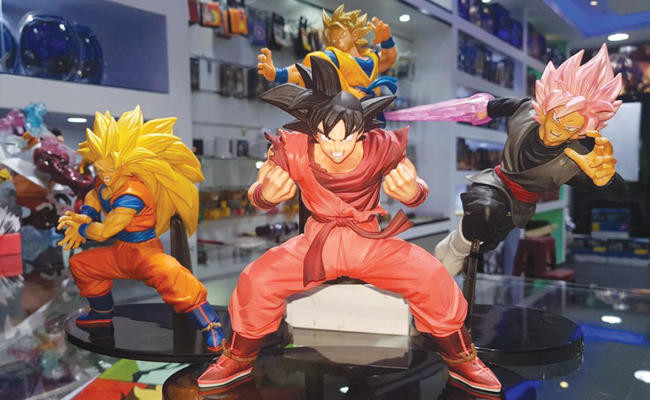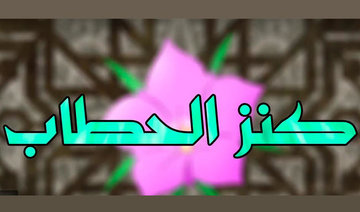JEDDAH: Two friends with a lifelong love of Japanese storytelling are reaping the rewards of a business success story that is almost as heroic as the manga and anime characters they admire.
When Noha Khayyat and Safa’a Akbar, co-owners of Nippon Sayko, began selling handmade manga and anime merchandise in a tiny booth tucked away in a Jeddah mall, they were told by other shop owners that they “would never survive.”
Now, eight years later, Nippon Sayko is one of the Kingdom’s most popular outlets for anime and manga, the Japanese animation films and comic books.
Demand for Japanese anime and manga has risen dramatically in Saudi Arabia in recent years, with a growing number of shops selling popular anime merchandise and manga books. Events such as Comic-Con, a comic and multimedia convention held in Riyadh and Jeddah, have also increased interest in Japanese animation and storytelling.
Khayyat and Akbar will join other outlets showing a range of anime and manga merchandise at a Comic-Con in Jeddah next month.
The two friends began selling anime-related merchandise while at university and were surprised by the enthusiastic response from fellow students. After graduating, and unhappy working for a company, they started Nippon Sayko.
“Our offices were on a higher level at a mall, so one day after work we were walking around the mall, and we found this women-only section. Back then women couldn’t work in malls, and it wasn’t even a shop, it was a tiny booth. We contacted several people who supported us year after year. They came, and it was a hit,” Khayyat told Arab News.
“It was really hard in the beginning as we didn’t want to ask our parents for financial support and wanted to do this independently. We used to work our office job from 8-5 and then open this booth at 5 p.m. and stay until 11.”
Khayyat and Akbar said they want to create a space where others can meet and share their love of anime and manga. “People stop in from all over the country just to Snapchat with their favorite (manga) characters, and it’s beautiful to see that connection,” Khayyat said.
“We did struggle at first because we were introducing something alien to the country,” she said. “We had people telling us ‘these things are for kids,’ or ‘it’s not really natural to like these things.’ Other shopkeepers told us, ‘you will never last.’ But look at us now. We’re still standing, while most of them couldn’t continue.”
Saudi Arabia had its first taste of anime as early as the 1970s, with popular television shows such as “Future Boy Conan” and “Grendizer” both favorites with children at the time.
Majed Nawawi, co-owner of Jeddah’s Anime Station Store, has been collecting figures since 1987 and, as a child, promoted his favorite shows and spread anime culture among his friends.
“The anime wave swept Saudi Arabia with the series Naruto in 2002-2003; it was revolutionary, and all sorts of people got into it,” Nawawi said. “Before that, this culture was unacceptable. After Naruto, people began embracing anime. That brought demand for action figures, merchandise and accessories.
“Who would have thought we’d witness Comic-Con, IGN and gaming events? We have large numbers of people who write, create and tell their stories through their own manga. We’ve come a long way,” he said.
A visitor to the store, Wed Al-Nahi, said she became interested in anime as anime as a child and still enjoys it as a university student. “The stories they tell, specifically fantasy, represent my imagination and the things I always dream of, but unfortunately cannot come true. I get to experience that through anime.
“I collect figures to show how much I admire those characters. It’s a reminder of the anime I watched and how much I enjoyed it,” she said.
Her older sister, Nora, 26, agrees. “My favorite anime has always been ‘The Rose of Versailles’ from 1979. I watched it when I was young and I still rewatch it religiously. I disagree with the misconception of anime being for kids, because it is for adults. There are many things I learned from it about literary references and the French Revolution. I love the main character, Lady Oscar, because she’s not your usual damsel in distress. She’s strong, independent and beautiful at the same time.”
Demand for Japanese storytelling surging in KSA as specialist outlets turn fantasy into reality
Demand for Japanese storytelling surging in KSA as specialist outlets turn fantasy into reality

Saudi minister holds talks with Chinese, EU officials on climate, global issues

RIYADH: Saudi Arabia's Minister of State for Foreign Affairs and Climate Envoy Adel Al-Jubeir received China's Special Envoy for Climate Change Liu Zhenmin in Riyadh on Sunday.
During the meeting, they discussed strengthening cooperation in climate action and environmental conservation, along with other topics of mutual interest.
Both officials also reviewed the Kingdom’s ongoing initiatives and achievements in this field, the Saudi Press Agency reported.
In a separate meeting, Al-Jubeir received the deputy secretary-general for political affairs at the European External Action Service, Olof Skoog, and his accompanying delegation.
The meeting reviewed international developments and the efforts being made to address them, in addition to discussing topics of mutual interest.
Sheikh Saleh bin Humaid to deliver Arafah sermon during Hajj 2025

- The day of Arafah (the 9th of Dhul Hijjah) is widely considered the pinnacle of Hajj, marking the most important day for pilgrims
- The sermon is delivered from Masjid Al-Nimra on Mount Arafat before Dhuhr and Asr prayers are performed together on Dhul Hijjah 9
RIYADH: Sheikh Saleh bin Humaid will deliver the Arafah sermon during this year’s Hajj, the Presidency of Religious Affairs announced on Sunday.
The day of Arafah (the 9th of Dhul Hijjah) is widely considered the pinnacle of Hajj, marking the most important day for pilgrims. Muslims around the world who are not performing the pilgrimage mark the day by fasting and engaging in worship.
The sermon is delivered from Masjid Al-Nimra on Mount Arafat before Dhuhr and Asr prayers are performed together on Dhul Hijjah 9.
Head of Religious Affairs of the Grand Mosque and the Prophet’s Mosque Sheikh Abdulrahman Al-Sudais thanked King Salman and Crown Prince Mohammed bin Salman for the appointment.
The appointment underscores the Kingdom’s global religious leadership, reflects its continued support for religious institutions, and exemplifies the leadership’s care for the two holy mosques, the presidency said.
Saudi deputy FM receives EU official in Riyadh

- A meeting was also held as part of the third round of political consultations between Saudi Arabia and the EEAS
RIYADH: Saudi Deputy Minister of Foreign Affairs Waleed Elkhereiji received Olof Skoog, deputy secretary-general for political affairs at the European External Action Service, and his accompanying delegation, in Riyadh on Sunday.
During the meeting, they discussed bilateral relations between the Kingdom and the EU and other topics of common interest, the Foreign Ministry wrote in a post on X.
A meeting was also held as part of the third round of political consultations between the Kingdom and the EEAS. Senior officials from both sides participated in the session, chaired by Raed bin Khalid Qarmli, director-general of the general directorate of policy planning at the Saudi Foreign Ministry, with Skoog representing the European side.
Pakistani ambassador to Saudi Arabia meets with CEO of Diriyah Gate Development Authority

- The meeting focused on strengthening Saudi-Pakistani ties in the field of heritage and culture
RIYADH: Ahmad Farooq, Pakistan’s ambassador to Saudi Arabia, met with Jerry Inzerillo, CEO of Diriyah Gate Development Authority in Riyadh.
The meeting focused on strengthening Saudi-Pakistani ties in the field of heritage and culture, the Pakistani Embassy wrote in a post on X on Sunday.
The ambassador presented Inzerillo with a painting from his own Diriyah-themed series, created to celebrate the Kingdom’s history and heritage.
He also presented him with a made-in-Pakistan FIFA-standard football “symbolizing Pakistan’s craftsmanship and the mutual spirit of friendship.”
Saudi reserve engages pilgrims on biodiversity

- Pilgrims were welcomed at Al-Shuqaiq in the Jouf region, where more than 4,000 gifts reflecting the reserve’s history and conservation efforts were distributed
RIYADH: Hajj pilgrims arriving in the Kingdom by land were introduced to projects and initiatives of the King Salman bin Abdulaziz Royal Reserve Development Authority.
The initiative aims to enhance biodiversity, restore vegetation and breed endangered species to create a more sustainable natural environment.
The authority also distributed educational brochures to raise awareness about environmental preservation, the Saudi Press Agency reported.
Pilgrims were welcomed at Al-Shuqaiq in the Jouf region, where more than 4,000 gifts reflecting the reserve’s history and conservation efforts were distributed.
Visitors were informed about the reserve’s environmental heritage, biodiversity, and commitment to sustainable ecological stewardship, the SPA added.
The authority works to preserve biodiversity by protecting habitats and creating safe environments for wildlife and plants to thrive.
Its achievements include planting more than 2.4 million trees, scattering four tonnes of native seeds and rehabilitating 250,000 hectares of degraded land.
The reserve hosts more than 290 documented bird species — about 58 percent of those recorded in the Kingdom — and includes five internationally recognized important bird areas.
Covering 130,700 sq. kilometers, the King Salman Reserve is the largest natural terrestrial reserve in the Middle East, spanning four administrative regions: Jouf, Hail, Northern Borders, and Tabuk.





















